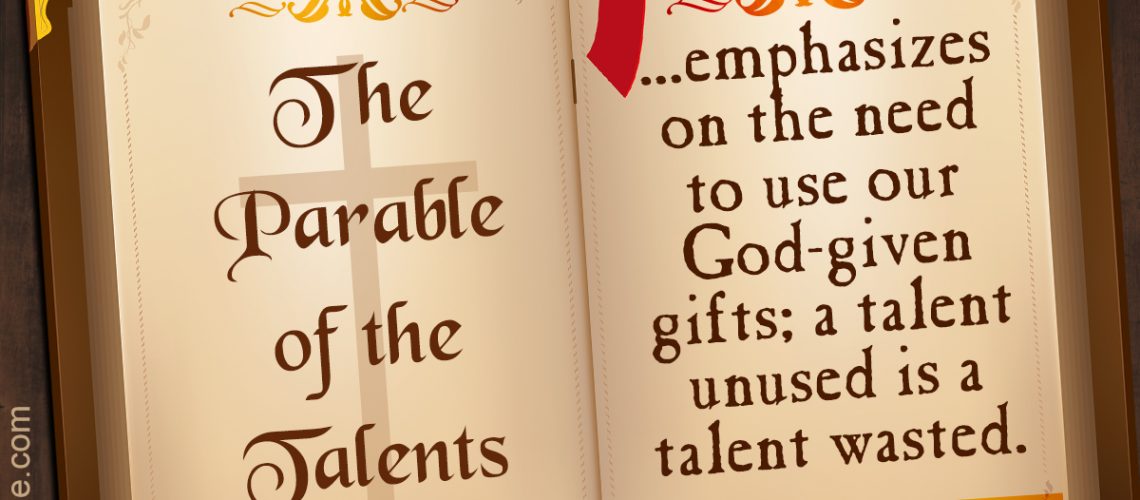 Whatever Is Taken for Granted Will Eventually Be Taken Away.
Whatever Is Taken for Granted Will Eventually Be Taken Away.
Most Christians will be familiar with this parable of the Talents. For those who are not familiar with this parable, it is the story of a landowner who is being given more than he already has because he has shown his responsibility for taking good care of what he has in his possession. Traditionally, the parable of the talents has been seen as an exhortation to Jesus’ disciples to use their God-given gifts in the service of God, and to take risks for the sake of the Kingdom of God. These gifts have been seen to include personal abilities (“talents” in the everyday sense), as well as personal wealth and possessions. A master puts his servants in charge of his goods while he is away on a trip. Upon his return, the master assesses the stewardship of his servants. He evaluates them according to how faithful each was in making wise investments of his goods to obtain a profit. It is clear that the master sought some profit from the servants’ oversight. A gain indicated faithfulness on the part of the servants. The master rewards his servants according to how each has handled his stewardship. He judges two servants as having been “faithful” and gives them a positive reward. To the single unfaithful servant, who “played it safe”, a negative compensation is given.
“They say ‘you don’t know what you’ve got until it’s gone.’ The truth is, you knew exactly what you had. You just didn’t think that you were going to lose it.” ~Unknown –
One should never take people (friends and relatives as well) or things (possessions) for granted. If gratitude and fortitude are practiced, one would be multiplying such “talents” and enjoying the “fruits” of one’s labor. A very good example is a man who has a beautiful, dutiful and loving wife. She has seen him through the good times and the bad times, raised wonderful well-rounded children and provided him daily home-cooked meals, a well-run household in the comfort of his home. Not only has he neglected her woefully, but he also has put her through much misery by his indifference and his passive-aggressive behavior. All her efforts were taken for granted and have gone unacknowledged, never mind being unappreciated. She has bourne and accepted all his negative comments and body language for many years.
Suddenly, it seems, that she has “awoken” from her stupor and is aware of her current negative surroundings. What is she still doing in this unhappy, untenable relationship with a husband who does not care for her well being and who still continues with his indifference to her unhappiness within their marriage? Her children are all grown, leading successful, happy positive lives with families of their own.
She is no longer a young maiden as she has spent her youth fulfilling her responsibilities as a young wife and mother with a household to run smoothly. Instead of being mindful of the tense and unhappy situation within their marriage, he has gone out to find other selfish pursuits that ended up as an addiction. Suffice to say, The Lord takes care of his beloved and will take action.
“Failure to use one’s gifts, the parable suggests, will result in negative judgment. From a psychological point of view, failure is the immediate result of the failure of feeling God’s love. The first two servants are able to see God in a positive perception, as “understanding, generous, and kind”, while the third servant sees God as “harsh, demanding, and critical”
Then the one who had received the one talent came and said, ‘Sir, I knew that you were a hard man, harvesting where you did not sow, and gathering where you did not scatter seed, so I was afraid, and I went and hid your talent in the ground. See, you have what is yours.’ But his master answered, ‘Evil and lazy servant! So you knew that I harvest where I didn’t sow and gather where I didn’t scatter? Then you should have deposited my money with the bankers, and on my return, I would have received my money back with interest! Therefore take the talent from him and give it to the one who has ten. For the one who has will be given more, and he will have more than enough. But the one who does not have, even what he has will be taken from him. And throw that worthless slave into the outer darkness, where there will be weeping and gnashing of teeth.’

